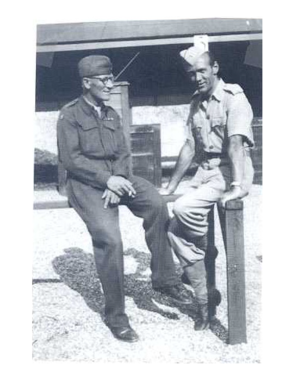Hans Tofte
(spook) | |
|---|---|
 Hans Tofte (on right) during the Korean War | |
| Born | 1911 Copenhagen, Denmark |
| Died | 28 Aug 1987 (Age 75) |
| Nationality | US |
| Member of | Office of Strategic Services |
| Interests | • Korean War • Guatemala/1954 coup d'état |
Hans Tofte worked as a trouble-shooter for CIA director Walter Bedell Smith and also trained guerrilla forces during the Korean War, and worked in Guatemala and Cuba afterward. His spying career was cut short when classified documents were found in his home in 1966.[1]
Contents
Background
Born in 1911 in Denmark to a maritime merchant family, Tofte had been stationed at age 19 to live in China as an employee of a Danish shipping firm that did business in east Asia. Living in Manchuria, he learned to speak Chinese, and gained an intimate knowledge of the country’s geography, political factions, and political personalities.[2] The Second World War brought him back to Denmark, where he saw some service in the anti-German resistance. Tofte escaped from Nazi-occupied Denmark in 1941 and eventually joined a clandestine British agency in an anti-Nazi underground. He later went to Australia, where he took commando training and then was placed behind the Japanese lines in Burma, running a supply line into China.[3]
OSS and CIA
Tofte joined the American Office of Strategic Services, forerunner of the CIA, in 1943 and was sent to Yugoslavia, where he joined the resistance efforts of Josip Broz Tit. At war’s end he joined the staff of General Walter Bedell Smith, then director of Central Intelligence and during the Korean War collected intelligence on North Korean and Chinese activities.
Tofte and his deputy, Colwell E. Beers, established a large CIA training and support facility (fifty acres) on Atsugi Air Force Base, a former Japanese Navy air station forty-seven miles south of Tokyo. His Office of Policy Coordination (covert) operations were covered as the Far East Air Forces Technical Analysis Group (FEAF/TAG).[4]
In late 1950, the Soviet Union released a large number of Japanese prisoners who had been held in captivity since the end of the Second World War. The Soviets intended to use the issue to score sympathy points with Japanese labor unions, many of which in those days were communist sympathizers. Tofte came up with the idea of making a movie about the abuse of Japanese prisoners in Soviet prisoner-of-war camps. On a shoestring budget, he used the secret diary of a former Japanese prisoner as the basis for anti-Soviet propaganda film that caused anti-Russian feeling in Japan to reach new heights. It was so successful, in fact, that it actually turned a profit, netting Tofte at least $400,000 which was turned over to his superiors.[2]
In 1959, he was part of a Special Survey Team to Colombia. Among their suggestions were the creation of irregular counter-guerrilla forces called Lanceros, the introduction of covert psychological warfare capabilities and new counterintelligence operations, and the establishment of civil affairs programs to rehabilitate the public image of the Washington-aligned military and police.[5]
Dismissal
Tofte had listed his Washington home for sale in 1966 when, without his knowledge, a fellow CIA agent was shown through. The agent did not realize that he was being shown through the home of a fellow member of the CIA until he by chance saw some classified material in one of the rooms. He reported the find to the CIA, which conducted an investigation and then dismissed Tofte.[3]
Tofte died of heart failure in 1987.
References
- ↑ https://canadiandimension.com/articles/view/canadian-mining-companies-and-the-making-of-modern-colombia
- ↑ a b https://www.returnofkings.com/51069/the-covert-operations-of-hans-tofte-during-the-korean-war
- ↑ a b https://www.latimes.com/archives/la-xpm-1987-09-13-mn-7539-story.html
- ↑ https://arsof-history.org/articles/v9n1_cia_paramilitary_page_1.html
- ↑ https://canadiandimension.com/articles/view/canadian-mining-companies-and-the-making-of-modern-colombia